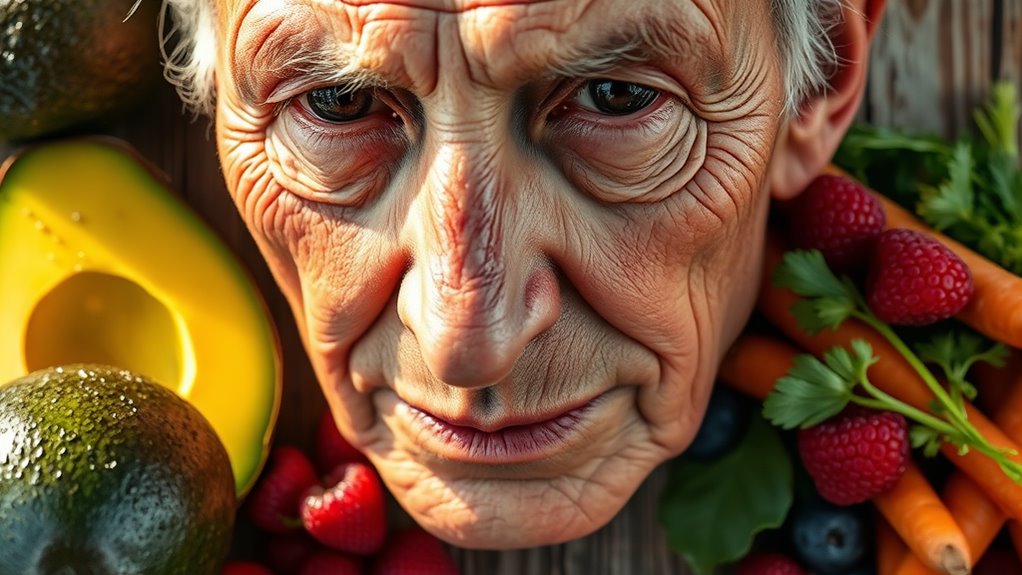The Link Between Your Diet and Wrinkles (Explained)
Your diet plays a crucial role in the aging process of your skin, especially when it comes to wrinkle formation. Nutrient-rich foods can either combat or exacerbate signs of aging. Antioxidants, essential fatty acids, and certain vitamins contribute significantly to skin health. However, excessive sugar and processed foods can lead to detrimental effects. Understanding these connections can help you make informed choices for maintaining a youthful appearance. What specific dietary changes can you implement for better skin health?
The Role of Antioxidants in Skin Health
Antioxidants play a crucial role in maintaining skin health by combating oxidative stress, which can accelerate aging and contribute to the formation of wrinkles.
When you incorporate a diet rich in antioxidants—such as vitamins C and E, selenium, and polyphenols—you’re actively supporting your skin’s resilience against free radicals.
These compounds neutralize harmful molecules, reducing cellular damage and promoting a youthful appearance.
Including colorful fruits, vegetables, and whole grains in your meals can enhance your skin’s vitality. Additionally, foods rich in nutrients and antioxidants not only support skin health but also improve overall well-being, making them essential for an effective anti-aging diet.
Hydration and Its Impact on Skin Elasticity
While many factors influence skin health, hydration stands out as a critical component affecting skin elasticity.
When your body is adequately hydrated, skin cells function optimally, maintaining structure and resilience.
Dehydration leads to a decrease in skin turgor, resulting in a loss of firmness and increased wrinkle formation.
Drinking sufficient water and consuming hydrating foods can replenish moisture levels, enhancing overall skin appearance.
Additionally, topical hydrating agents like hyaluronic acid can support skin elasticity by attracting moisture.
Prioritizing hydration is essential for maintaining youthful, elastic skin and preventing premature aging signs. Incorporating anti-aging nutrition into your diet can further support skin health and vitality.
Make hydration a key focus in your skincare routine.
Essential Fatty Acids and Their Benefits for Aging Skin
Essential fatty acids (EFAs), particularly omega-3 and omega-6, are crucial for skin health. They help maintain the skin’s lipid barrier, preventing moisture loss and reducing inflammation. By incorporating sources of EFAs, like fatty fish, flaxseeds, and walnuts, you support your skin’s structure and function. These fatty acids also promote collagen production, enhancing skin firmness and reducing the appearance of fine lines. Additionally, foods rich in antioxidants and nutrients can further amplify the skin-rejuvenating effects of EFAs. Ensuring adequate EFA intake can significantly improve your skin’s resilience, helping you maintain a youthful appearance as you age.
The Effects of Sugar and Processed Foods on Wrinkles
How do sugar and processed foods contribute to the development of wrinkles? High sugar intake leads to glycation, damaging collagen and elastin fibers crucial for skin elasticity. Processed foods, often rich in unhealthy fats and preservatives, exacerbate inflammation and oxidative stress, accelerating aging. Additionally, real nutrition emphasizes whole foods that support skin health, contrasting sharply with the adverse effects of junk food.
| Factor | Effect on Skin |
|---|---|
| Sugar | Increases glycation |
| Processed Foods | Promotes inflammation |
| Trans Fats | Deteriorates skin health |
Vitamins and Minerals That Promote Youthful Skin
Numerous vitamins and minerals play a critical role in maintaining youthful skin and preventing wrinkles.
Vitamin C is essential for collagen synthesis, enhancing skin elasticity. Vitamin E acts as an antioxidant, protecting skin from oxidative stress. Vitamin A promotes cell turnover, reducing fine lines. Omega-3 fatty acids, found in fish, support skin hydration and barrier function. Zinc is vital for skin repair and inflammation control. Selenium helps protect against UV damage. Incorporating nutrient-rich foods into your diet can significantly contribute to skin health. Prioritizing sources rich in these vitamins and minerals can help you achieve a more youthful appearance over time.
The Importance of a Balanced Diet for Overall Skin Wellness
A balanced diet is fundamental for achieving and maintaining overall skin wellness.
Proper nutrition fuels your body and supports skin health, enhancing its appearance and resilience.
Consider these essential components:
- Antioxidants: They combat free radicals, reducing oxidative stress and preventing premature aging.
- Healthy Fats: Omega-3 fatty acids help maintain skin’s lipid barrier, promoting hydration and elasticity.
- Hydration: Adequate water intake helps keep your skin plump and reduces the appearance of fine lines.
Incorporating these elements into your daily diet can profoundly impact your skin’s vitality, ensuring you look and feel your best. Additionally, a diet rich in nutritious food choices can further enhance your skin’s radiance and overall health.

